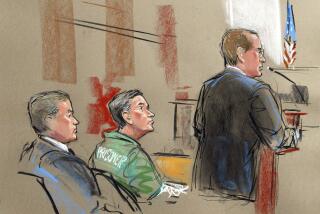Fraud Case Figure Was Informant, FBI Says
- Share via
An Orange County executive at the heart of a massive investment fraud case was once an FBI informant in investigations of organized crime in Southern California, according to federal authorities and others closely involved in the case.
The disclosure comes as the FBI and other authorities are investigating the late Luigi DiFonzo and several associates in the DFJ Italia investment firm on suspicion of running a $44.5-million Ponzi scheme.
When the Irvine firm closed its doors in March, it left about 700 investors with losses in the tens of millions of dollars.
The timing and nature of DiFonzo’s relationship with the FBI are important because they raise questions about whether federal authorities should have known about the alleged illegalities at DFJ Italia.
DiFonzo, 53, died of a prescription drug overdose Aug. 14, just as authorities were moving to seize his $4-million Laguna Niguel house.
The investigation has since intensified, as the FBI and Securities and Exchange Commission pursue leads on whether DiFonzo, DFJ co-founder Angelo Ales and other DFJ executives spent their clients’ millions on themselves.
No charges have been filed, but authorities have seized DiFonzo’s home, at least seven sports cars, numerous bank accounts and cartons of financial documents during raids and searches.
The FBI confirmed Wednesday that its agents worked with DiFonzo but say that relationship lasted only three months in mid-1996 before the bureau abruptly ended the arrangement.
“For a limited time period, DiFonzo cooperated with us regarding a separate investigation,” said FBI Special Agent Matthew McLaughlin, a bureau spokesman. “At the end of that time frame we terminated any cooperation with him.”
The FBI traditionally does not disclose its arrangements with informants, living or dead. The agency took the unusual step of confirming its relationship with the twice-convicted felon because it is investigating him. Federal authorities also wanted to state publicly that DiFonzo’s suspected criminal activities as head of DFJ Italia came long after they worked with him, McLaughlin said.
DiFonzo’s lawyer, John Barnett, confirmed that his client had worked with the FBI, saying he “did assist law enforcement in various capacities while in California.”
Barnett said that he wasn’t sure when the relationship ended, but that DiFonzo was not working with the FBI during the time he is alleged to have masterminded the Ponzi scheme.
“People continue to give information to agents regardless of status, so I can’t say when [DiFonzo] no longer assisted law enforcement,” Barnett said. “They may have called up and asked, ‘Do you know where this person is or can you help us with this?’ ”
DiFonzo’s widow, however, maintains that her husband’s relationship with the FBI was more far-ranging.
“They are so full of it,” said Brenda DiFonzo, who met her husband in 1997 and married him in May. “I know he had multiple conversations with them after that. I know that he kept [two FBI agents’] business cards in his pocket until the day he died and that he spoke to an agent in New York regularly.”
The investment firm was popular with investors, stating that it could obtain annual returns of at least 24% by putting money into precious metals and trading in European currency. A court-appointed trustee in the case, however, described it as a typical “Ponzi scheme,” in which ringleaders use some investor funds to pay off others while keeping most of the money for themselves.
In June or July of 1999, an Orange County businessman visited the FBI and gave agents details of DFJ Italia investment practices “that sounded fishy,” McLaughlin said. “So we initiated an investigation into DFJ Italia which continues,” he said.
DiFonzo’s cooperation could have come in a variety of ways, without his ever having to testify in court. Most informants in such cases are never identified.
Neither FBI officials nor attorney Barnett would comment on whether DiFonzo helped authorities investigate organized crime figures or whether he was paid.
But DiFonzo’s wife, and other sources, said his knowledge of organized crime was what made him such an attractive potential informant to federal authorities.
DiFonzo and Ales met in federal prison and shared connections in the world of organized crime, authorities said.
DiFonzo was convicted in 1980 of filing securities documents containing false information and again in 1989 of fraud. He also wrote a 1983 biography of Vatican financier Michele Sindona that alleged links between the Catholic Church, the Mafia and the international banking community.
Ales has been convicted of filing false tax returns, illegally receiving Social Security and giving false testimony at a government hearing.
More to Read
Sign up for Essential California
The most important California stories and recommendations in your inbox every morning.
You may occasionally receive promotional content from the Los Angeles Times.













